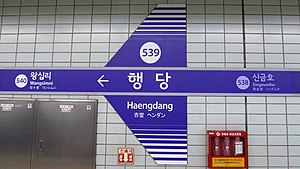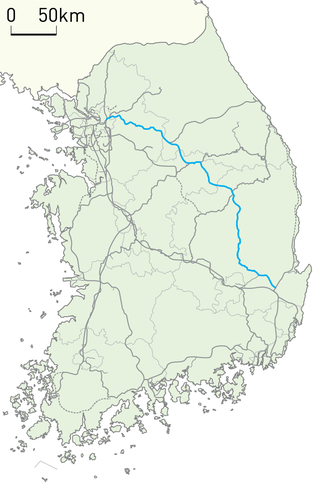
The Jungang line is a railway line connecting Cheongnyangni in Seoul to Moryang in Gyeongju in South Korea, traversing central South Korea from the northwest to the southeast. It is also referred to as the rail line of the Seoul Metropolitan Subway from Yongsan station to Jipyeong station. The section from Cheongnyangni to Dodam was designated as a semi-high-speed railway.
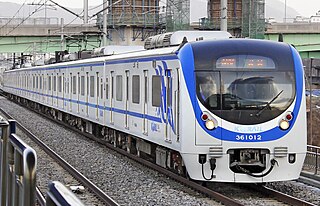
The Gyeongchun Line is a regional rail line between Seoul and Chuncheon, South Korea, operated by Korail. Its name is derived from Gyeong and Chuncheon. It was completely reconstructed in the 2000s. Service on it has operated between Sangbong station on the Jungang Line in eastern Seoul and Chuncheon station, as part of the Seoul Metropolitan Subway system, since December 21, 2010. A class of regional rail service named ITX-Cheongchun began operations on February 28, 2012, linking Chuncheon to Cheongnyangni and Yongsan Stations.
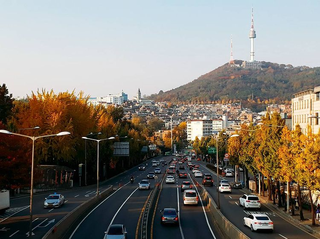
Yongsan District is one of the 25 districts of Seoul, South Korea.

Seoul Subway Line 8 of the Seoul Metropolitan Subway was built from 1990 to 1999 and mainly serves the southeastern parts of Seoul and Seongnam. The first section from Jamsil to Moran opened in 1996, and the second section from Moran to Amsa was opened in July 1999. The line color is rose. In 2019, Line 8 had an annual ridership of 112 million or about 307,000 people per day. At 17.7 km (11.0 mi) in length, Line 8 is the shortest of all heavy rail Seoul Metropolitan Subway lines.

Insa-dong (Korean: 인사동) is a dong, or neighborhood, in Jongno District, Seoul, South Korea. Its main street is Insadong-gil, which is connected to a number of alleys that lead deeper into the district, with modern galleries and tea shops. Historically, it was the largest market for antiques and artwork in Korea.

Seoul Subway Line 9, operated by Seoul Line9 Operation, is a subway line in Seoul, part of the Seoul Metropolitan Subway. The line runs east from Gaehwa station or Gimpo International Airport station along the south bank of the Han River towards VHS Medical Center in Gangdong. In 2019, Line 9 had an annual ridership of 225 million or about 616,000 people per day.

Gwanghwamun Station (Korean: 광화문역) is a station on the Seoul Subway Line 5 in South Korea. It is not the closest subway station to the actual gate of Gwanghwamun, which it is named after. It is located next to the U.S. Embassy in Seoul.

Hanyang University Station (Korean: 한양대역) is a station on the Seoul Subway Line 2. This partially underground station lies within the Hanyang University campus, and is located in Haengdang-dong, Seongdong-gu, Seoul.

Wangsimni Station is a station on Seoul Subway Line 2, Seoul Subway Line 5, Gyeongui–Jungang Line, and Suin–Bundang Line; most Suin–Bundang Line trains end service here, though a few daily services continue along the tracks used by the Gyeonggi-Jungang line to terminate at the next station, Cheongnyangni in northeastern Seoul. It is located in Haengdang-dong, Seongdong-gu, Seoul.

Seongdong District (Seongdong-gu) is one of the 25 gu which make up the city of Seoul, South Korea. It is situated on the north bank of the Han River. It is divided into 20 dong (neighbourhoods).
Hanyang University Gymnasium is an indoor sporting arena located in Seoul, South Korea. The capacity of the arena is 8,000 people and was built in 1986 to host the volleyball events at 1986 Asian Games and during the 1988 Summer Olympics. It hosted a sport stacking task on The Amazing Race 29 and The Amazing Race Australia 4. An indoor gymnasium with two stories underground and four stories above ground with reinforced concrete truss structure built on the campus of Hanyang University in Haengdang-dong, Seongdong-gu. It is a building of 31,247 m2 with a building area of 31,247 m2 and its size is 80m * 80m * 26m. The floor of the stadium is 50m * 36m and the practice field: 37m * 21m. In the 1988 Seoul Olympics, it is offered as a volleyball arena. Evening games are possible.

Sejong or Sejong City, officially the Sejong Special Self-Governing City, is a special self-governing city and the de facto administrative capital of South Korea.

Singeumho Station is a station on Seoul Subway Line 5, Seoul, South Korea. Prior to its opening, it was originally planned to be called Musumak Station (무수막역). Because of the relatively high altitude of this neighborhood, the platform is located eight floors below ground level.

Achasan, also known as Rear Entrance to Seoul Children's Grand Park, is a subway station on Line 5 of the Seoul Metropolitan Subway. Located in Gwangjin-gu, in Seoul, South Korea the station is near the rear entrance of Seoul Children's Grand Park.

Seoul, the capital of South Korea, has been called by a number of formal and informal names over time. The word seoul was originally a common noun that simply meant "capital city", and was used colloquially to refer to the capital throughout Korean history. Seoul became the official name of the South Korean capital after its liberation from Japan after the Second World War.
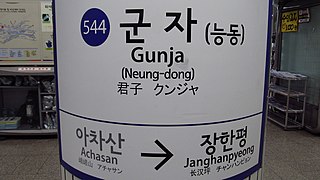
Gunja (Neung-dong) Station (Korean: 군자역) is a station on Line 5 and Line 7 of the Seoul Subway in Gwangjin-gu, Seoul.
Haengdang-dong is a dong, neighbourhood of Seongdong-gu in Seoul, South Korea.
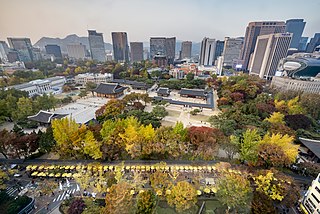
Seoul, officially Seoul Special City, is the capital and largest city of South Korea. The broader Seoul Capital Area, encompassing Gyeonggi province and Incheon metropolitan city, emerged as the world's fourth largest metropolitan economy in 2014, trailing only Tokyo, New York City, and Los Angeles, hosting more than half of South Korea's population. Although Seoul's population peaked at slightly over 10 million, it has gradually decreased since 2014, standing at approximately 9.97 million residents as of 2020. Seoul is the seat of the South Korean government.
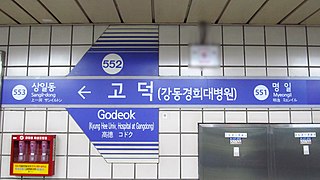
Godeok Station is a subway station on Seoul Subway Line 5 in Gangdong-gu, Seoul. It links to Baejae High School, Myungil High School, Gwangmun High School, Hanyoung High School, and Hanyoung Foreign Language High School. It will be part of Seoul Subway Line 9 in 2028.

Bundang (Korean: 분당) is a planned community in the Bundang-gu district of Seongnam, South Korea. It was developed to encourage affordable housing and urban decentralization. The community has a sports complex, a park and a youth center.
